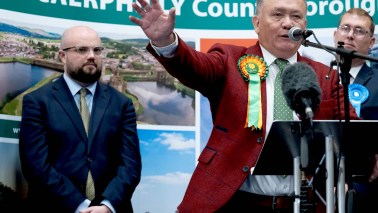Vladimir Putin still swears that there are no Russian troops in Crimea, so their mission is to say as little as possible as they invade this holiday region in their unmarked uniforms and vehicles. It is remarkable how soon you get used to shouting questions at these heavily armed special forces soldiers while they pretend not to be Russians. They tend not to take the bait: the most you’ll get out of them is a curt ‘Nyet’. I wandered up to an officer who seemed to be in charge of seizing a Ukrainian naval base in the old Tartar capital of Bakhchisaray. He wore all black, his face hidden by a balaclava and his vest stuffed with nasty-looking weapons. ‘Can we talk?’ I asked. ‘Don’t ask stupid questions,’ he snapped, in what my interpreter said was a strong Russian accent. ‘Of course I am not going to answer them.’
The Ukrainian officers, by contrast, tell you whatever you want and then insist you take their mobile numbers. Take, for example, Colonel Yuli Mamchuk, who marched his motley force of 300 soldiers into the first Russian fire of this conflict. He happily chatted to reporters throughout the standoff. At one point his mobile rang — I asked who it was. The defence ministry in Kiev, he replied. ‘They are just telling me to do things in my best interests.’ Little wonder these officers feel abandoned by their leaders.
I have been here for three weeks, after expecting to stay three days. I brought just one pair of jeans. They split, so I bought a replacement pair, which are now so filthy I suspect they could go to war on their own. I foolishly thought I’d take out money on arrival — hard to do when the cash machines are closing down. The hotel I’m staying in displays its Soviet roots with an insistence on daily payment of bills — and only cash taken for food. There is much to love about Ukraine, but it is no foodie heaven. Sometimes there seems to be only the loosest relationship between the food you ask for and the food you’re served. But after a traumatic day watching bodies pile up in Kiev’s Independence Square, I chanced upon a babushka called Nina running a free field kitchen with her family. Her steaming buckwheat soup, served in a plastic pint glass with a slice of lard on the side, was something special.
The confrontations here tend to follow a certain choreography, which I witnessed when reporting the apparent kidnap of a Ukrainian military commander. First come the Russian troops, then their annoying local stooges to stop ‘provocations’. Inevitably there is an orthodox priest, with a chunky gold cross and big beard, to offer prayers. Then come the parents; this time, a tearful mother, berating Russians for making children ‘the hostages of your dirty politics’. The full story was slightly different than made out. This commander got drunk and mistakenly climbed into a car filled with supporters of Russian Unity — a party which won 4 per cent of the vote at the last election, but now runs Crimea following a dodgy vote in a troop-filled parliament. They took him to see their boss, who told him to hand over his army base or go to prison. He chose the former. ‘It was like the movies,’ he said with a rueful smile. ‘They invited me to be their guest. I was treated well, they gave me food and water.’ The course of history swings on such human dramas.
The mood is darkening, now, as Crimea prepares for the phoney independence referendum. Many people are confused or frightened by the speed of events. Others, especially the middle classes, are horrified at seeing their city taken over by ‘unemployable youths in red armbands’, as one described the pro-Russian militia who prowl the streets. I saw one of them beat up a protester in front of police. Another pushed a Russian cameraman; even he grumbled about men with sticks being able to do what they wanted. A third, arguing with a foreign journalist, pompously proclaimed that Crimea was, in effect, already part of Russia. ‘Wrong,’ thundered a nearby man from St Petersburg. ‘You are not joining Russia until we decide we will have you.’
The Ukranian military may have failed to stop a Russian invasion, but Crimea’s women may prove to be the hardest obstacle. Tartar mothers mounted the first protests, then metropolitan women began holding demonstrations with white balloons. ‘We must show that Crimea is not just crazy people waving Russian flags,’ said Oksana Novikova, a businesswoman who started one peace group. Such courage is impressive, given the abuse and intimidation. One student lawyer showed me posters pasted up around town featuring her name and picture, alongside accusations that she had betrayed her people. This Ukrainian patriot is an ethnic Russian, the people supposedly rushing to join the motherland. Now she is preparing to leave Crimea, like many young people. ‘They will have to break all my bones to make me become a Russian citizen,’ she said. The Tartars, Muslims who were ethnically cleansed by Stalin 70 years ago, feel just as strongly. It’s a reminder that, for all the ease with which he has seized the peninsular, Putin’s Crimean war may just be beginning.






Comments